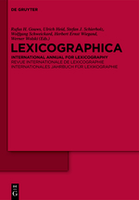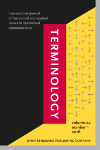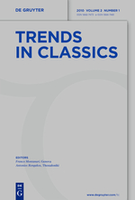
LEXICOGRAPHICA
metrics 2024
Pioneering Insights in Linguistics and Lexicography
Introduction
LEXICOGRAPHICA, published by WALTER DE GRUYTER GMBH, stands as an invaluable resource in the field of linguistics and language studies. With an ISSN of 0175-6206 and an E-ISSN of 1865-9403, this esteemed journal has garnered a solid reputation, reflected in its position within the Q2 quartile for linguistics and language as of 2023. Hailing from Germany, and with a robust publication history spanning from 1996 to 2023, LEXICOGRAPHICA offers a platform for scholarly discourse and innovative research concerning lexicography and its intersections with other linguistic fields. Ranked #442 in Arts and Humanities and #516 in Social Sciences by Scopus, it occupies a pivotal space in academic literature, making it essential reading for researchers, professionals, and students committed to advancing their understanding of language documentation and analysis. Although not open access, the journal’s commitment to high-quality peer-reviewed content ensures that it remains a respected outlet for original research, critical evaluations, and discussions that shape the future of lexicographic studies.
Metrics 2024
 0.23
0.23 0.30
0.30 -
- 14
14Metrics History
Rank 2024
Scopus
IF (Web Of Science)
JCI (Web Of Science)
Quartile History
Similar Journals

Terminology
Navigating the Complexities of Language and Information ScienceTerminology is a highly regarded journal published by John Benjamins Publishing Co, focusing on the multidisciplinary fields of communication, library and information sciences, and linguistics. Since its inception, the journal has provided a platform for rigorous research and innovative discussions surrounding the theory and practice of terminology, shedding light on its significance in effective communication and knowledge organization. With its Q2 ranking in the 2023 quartiles for communication and linguistics, and an impressive 78th percentile ranking in language and linguistics according to Scopus, Terminology stands as an influential resource for scholars and practitioners alike. Although not an open access journal, it is committed to enhancing the visibility and dissemination of critical academic work. The journal's comprehensive scope includes empirical studies, critical reviews, and theoretical explorations from 1994 to 2024, making it a vital resource for researchers, professionals, and students seeking to advance their understanding of linguistic practices and terminological challenges in an increasingly interconnected world.

Estudios de Linguistica-Universidad de Alicante-ELUA
Exploring New Horizons in Linguistics from AlicanteEstudios de Linguistica-Universidad de Alicante-ELUA is a distinguished academic journal dedicated to advancing the field of linguistics, published by Universidad de Alicante. With an Open Access model adopted since 2020, ELUA facilitates greater accessibility to pioneering research for scholars and enthusiasts alike. The journal's ISSN is 0212-7636 and its E-ISSN is 2171-6692, ensuring it is indexed and easily discoverable in academic databases. Though the journal's H-Index is currently not specified, its commitment to disseminating high-quality linguistics research positions it as a valuable resource for researchers, professionals, and students. The journal aims to foster scholarly dialogue and innovation in various linguistic domains, making it an essential platform for sharing insights and findings that shape contemporary linguistic studies. Based in Alicante, Spain, ELUA is poised to contribute significantly to the global linguistics landscape.

LINGUA NOSTRA
Connecting emerging voices in language studies.LINGUA NOSTRA, an esteemed journal published by CASA EDITRICE G C SANSONI SPA, has been a notable contributor to the field of linguistics since its inception in 1968. With an ISSN of 0024-3868, this journal is dedicated to advancing knowledge and research in linguistics and language studies. Despite its current Q4 category ranking in both the Linguistics and Language fields, and its Scopus ranking placing it in the lower percentiles, LINGUA NOSTRA remains a valuable resource for emerging and established scholars alike, offering insights into various linguistic phenomena. The journal publishes original research, reviews, and theoretical works that stimulate discourse in linguistic practices and methodologies. Based in Florence, Italy, this journal is not open access but continues to be a crucial platform for linguistic inquiry and findings, bridging historical and contemporary linguistic theories as it converges over the decades.

Revista de Investigacion Linguistica
Championing high-quality research in the heart of Spain.Revista de Investigacion Linguistica is a distinguished open-access journal dedicated to the exploration and advancement of linguistic research, published by the University of Murcia since its inception in 1997. With the ISSN 1139-1146 and E-ISSN 1989-4554, this journal serves as a vital resource for linguistics scholars and enthusiasts around the globe. Located in the vibrant city of Murcia, Spain, the journal aims to foster academic discourse by disseminating high-quality research that covers a broad spectrum of linguistic topics, including syntax, semantics, phonetics, and sociolinguistics. Its commitment to open access ensures that knowledge is freely available, promoting a wider reach and impact in the academic community. By contributing to the advancement of linguistic studies, the Revista de Investigacion Linguistica plays a crucial role in shaping contemporary linguistic theories and practices, making it an essential publication for researchers, professionals, and students alike.

Hrvatski Dijalektoloski Zbornik
Unveiling the Nuances of Language VariationHrvatski Dijalektoloski Zbornik is an esteemed academic journal dedicated to the field of Dialectology and Linguistic Research, published by the Croatian Academy of Sciences and Arts, Department of Linguistic Research. With an Open Access policy established since 2015, the journal aims to promote the dissemination of research findings and encourage scholarly exchange among linguists and dialectologists. The journal has achieved recognition in the field, ranking in the Q3 category for Linguistics and Language in 2023, and its impact can be further gauged through its Scopus rankings, positioning it favorably within both the Arts and Humanities and Social Sciences categories. As it converged its publication years from 2017 to 2023, the journal continues to showcase rigorous research from various dialectical studies, contributing significantly to the understanding of language variation and evolution in Croatia and beyond. Researchers, professionals, and students alike are encouraged to explore the rich compendium of linguistic scholarship that this journal offers.

Philologica Canariensia
Illuminating the vibrant fields of literature and language.Philologica Canariensia is a distinguished academic journal published by the University of Las Palmas de Gran Canaria, focusing on the vibrant fields of Literature and Literary Theory as well as Linguistics and Language. With an impact factor that positions it in the Q1 and Q2 quartiles in its respective categories as of 2023, the journal has established itself as an important platform for scholarly communication and research. Since transitioning to Open Access in 2014, it has broadened its reach, allowing researchers, professionals, and students from around the globe to access high-quality publications without barriers. With a commendable presence in Scopus rankings, including a rank of #309 out of 1106 in Literature and Literary Theory, Philologica Canariensia aims to foster an interdisciplinary dialogue and advance knowledge in the humanities. The journal's commitment to publishing innovative research makes it an essential resource for anyone engaged in exploring linguistic and literary phenomena.

SPRACHWISSENSCHAFT
Pioneering New Horizons in Language StudiesSPRNACHWISSENSCHAFT is a prominent academic journal dedicated to the field of linguistics and language studies, published by Universitätsverlag C Winter Heidelberg GmbH. With an ISSN of 0344-8169 and an E-ISSN of 2567-6563, this journal serves as a critical platform for researchers and scholars to explore innovative research developments and theoretical frameworks in linguistics. Although the journal's coverage in databases has been discontinued from 2021, it continues to hold significance in the academic community, reflected in its 2023 Q3 ranking in both the Linguistics and Language category, placing it at the 41st percentile in Arts and Humanities. Exploring various dimensions of language and communication, SPRNACHWISSENSCHAFT aims to contribute to ongoing conversations within the discipline, making it an essential resource for academics interested in the evolving landscape of linguistic research.

Trends in Classics
Fostering critical dialogue in the field of Classics.Trends in Classics is a distinguished academic journal published by WALTER DE GRUYTER GMBH, dedicated to advancing the field of Classics through critical scholarship and innovative research. With an ISSN of 1866-7473 and an E-ISSN of 1866-7481, this journal offers a platform for scholars from around the globe to share insights on classical literature, history, and archaeology. Indexed in Scopus and awarded a respectable Q4 classification in Classics, it ranks 48th out of 170 in the Arts and Humanities category, placing it in the top 72nd percentile—an indicator of its growing influence and contribution to the field. Operating from Germany, specifically from Genthin Strasse 13, D-10785 Berlin, the journal spans converged years from 2009 to 2024, fostering ongoing dialogues and developments within classical studies. Although it does not currently offer open access, its commitment to scholarly excellence makes it a vital resource for researchers, professionals, and students alike, who seek to deepen their understanding of ancient cultures and their lasting impacts on contemporary society.

Lexikos
Elevating the conversation in linguistics and cognitive studies.Lexikos is a distinguished academic journal in the field of linguistics and language studies, published by BURO VAN DIE WAT in South Africa. Since its establishment in 1991, Lexikos has maintained an open-access format, allowing researchers, professionals, and students unrestricted access to its valuable content. The journal operates under a comprehensive scope, emphasizing the intersection of language, linguistics, and cognitive studies, making it a vital resource for scholars in these fields. With an impressive Q2 ranking in the Linguistics and Language category for 2023, Lexikos is recognized for its rigorous peer-review process and high-quality publications, contributing significantly to both the Arts and Humanities and Social Sciences disciplines. Its Scopus ranking positions it favorably within the industry, showcasing its impact and relevance with 68th and 65th percentiles in respective categories. By fostering a platform for innovative research and interdisciplinary dialogue, Lexikos plays a crucial role in advancing knowledge and understanding in linguistics and language studies.

Revue Roumaine de Linguistique-Romanian Review of Linguistics
Elevating Linguistic Scholarship to New Heights.Revue Roumaine de Linguistique-Romanian Review of Linguistics, published by EDITURA ACAD ROMANE, is a distinguished journal dedicated to advancing the field of linguistics and promoting scholarly discourse in language-related research. With its ISSN 0035-3957, this journal has established itself as a valuable resource for researchers and practitioners alike, particularly within the linguistics and language categories where it holds a respectable Q3 ranking as of 2023. The journal covers a wide array of topics, focusing on both theoretical and applied linguistics, making it an essential platform for those interested in the latest developments, methodologies, and findings in the field. Although it currently does not operate under an open access model, the Romanian Review of Linguistics remains an impactful publication with its regular convergence of years from 2010 to 2023, providing a comprehensive archive for ongoing research endeavors. With its address located in Bucuresti, Romania, this journal continues to foster a vibrant academic community and supports the ongoing exploration of linguistic phenomena across diverse contexts.